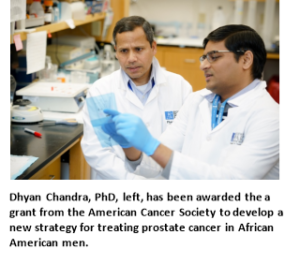Roswell Park Receives Nearly $1 Million to Address Race-Related Disparities in Prostate Cancer
Grants from Department of Defense and American Cancer Society fund efforts to develop better tests and therapies
- African American men have highest rates of prostate cancer, and worst outcomes
- One study will investigate genetic and epigenetic causes of racial disparities
- Another could provide new treatments tailored to African American patients
BUFFALO, N.Y. — African American men currently have the highest rates of prostate cancer in the United States and the poorest outcomes. New grants from the U.S. Department of Defense and American Cancer Society will fund work by two Roswell Park Comprehensive Cancer Center teams focused on understanding and eliminating prostate cancer health disparities.
Compared with men in other racial and ethnic groups, African American men are also at higher risk of being diagnosed with a highly aggressive form of prostate cancer at a younger age. Race-related differences in access to prostate cancer screening and treatment play a large role in these persistent health disparities, but the role of other contributing factors, such as genetic and epigenetic differences in susceptibility and treatment response, remains largely unknown.
 Anna Woloszynska, PhD, Associate Professor of Oncology in Roswell Park’s Department of Pharmacology and Therapeutics, received a two-year, $613,000 grant from the U.S. Department of Defense to study the genetic and epigenetic vulnerabilities of prostate cancer in African American men.
Anna Woloszynska, PhD, Associate Professor of Oncology in Roswell Park’s Department of Pharmacology and Therapeutics, received a two-year, $613,000 grant from the U.S. Department of Defense to study the genetic and epigenetic vulnerabilities of prostate cancer in African American men.
Image“We believe that identifying new molecular features, specific to African American patients, will enable us to design novel diagnostic and prognostic tests that will help to reduce racial disparities,” says Dr. Woloszynska, whose work will focus on the unique molecular pathways that influence prostate cancer biology.
 Dhyan Chandra, PhD, Professor of Oncology in the Department of Pharmacology and Therapeutics, received a two-year, $240,000 grant from the American Cancer Society to study cytochrome c deficiency in African American men.
Dhyan Chandra, PhD, Professor of Oncology in the Department of Pharmacology and Therapeutics, received a two-year, $240,000 grant from the American Cancer Society to study cytochrome c deficiency in African American men.
“Due to lack of the mitochondrial protein cytochrome c, standard prostate cancer therapies often are less effective in African American men,” says Dr. Chandra, who hopes the work will point the way to new, more effective therapies. “Our goal is to inhibit signals that promote prostate cancer in these men, which will allow cancer cells to enhance production of this key protein, cytochrome c, leading to the demise of prostate cancer cells in African American men.”
“Prostate cancer’s unequal impact on the African American community punctuates the need for innovative research like these studies,” says Elizabeth Bouchard, PhD, MA, Senior Vice President and Associate Director for Community Outreach and Engagement in Roswell Park’s Department of Cancer Prevention and Control. “It’s especially exciting to see this work advancing in the areas of both testing for prostate cancer and treatment options, and I’ll be following these projects from our colleagues in pharmacology with great interest.”












